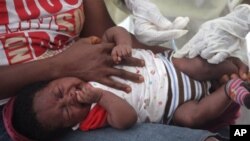The Ebola epidemic in Guinea is seriously compromising the fight against malaria, its government said. In scores of cases, doctors are confusing malaria with Ebola, delaying the right life-saving treatment.
Guinea's government committee against malaria said many of the undocumented deaths suspected of being from Ebola may actually be from malaria.
This presents an even deadlier situation in a country that the World Health Organization has ranked among the 10 nations with the highest malaria mortality rates.
Guinea’s national coordinator for the fight against malaria, Dr. Timothy Guilavogui, said malaria each year affects 44 percent of Guineans, or about 5 million people. The disease kills at least 10 people in Guinea every week, he said.
In contrast, the Ebola outbreak – which began in Guinea in December – has infected fewer than 2,000 people in the country and caused close to 1,200 deaths, according to the World Health Organization.
A devastating setback
Guilavogui said Ebola is eroding Guinea’s recent gains in reducing the malaria mortality rate by 50 percent.
The main problem is that malaria and Ebola share similar symptoms initially, including high fever, nausea and vomiting. Only blood tests can distinguish between them.
But fear of Ebola is keeping sick people away from needed care, Guilavogui said. He added that even health care workers stay away from health centers, worrying about Ebola infection or the risk of being stigmatized as if they had the virus.
While there is no known cure for Ebola, early medical intervention and support such as rehydration therapy can significantly improve survival chances.
Malaria can be treated
Malaria can be treated successfully if medication is administered early on. But that is not happening.
Guilavogui said his team has noted a drastic reduction in the number of malaria patients visiting health centers, fearful they will be mistaken for having Ebola.
Another problem, he said, is that the awareness campaign on how to prevent and treat malaria has ground to a halt. Many health care workers are afraid to go into communities after high-profile attacks on Ebola educators. They also fear Ebola infection themselves.
Both malaria and Ebola need urgent attention to stop their deadly toll in Guinea, Guilavogui said. He said he and some other health professionals are looking to coordinate awareness campaigns and speed training on diagnosing both illnesses. And he said he hoped the fight against malaria eventually will benefit from some of the financial resources being poured into Guinea to stop Ebola.




